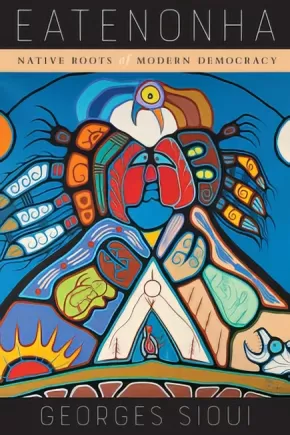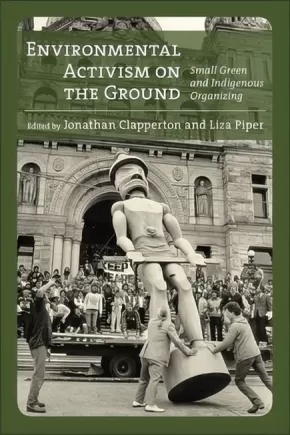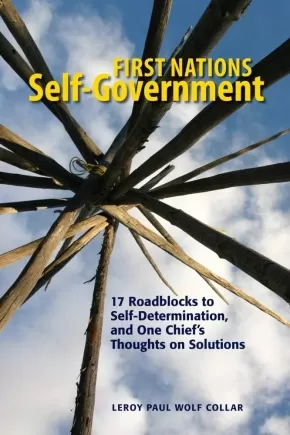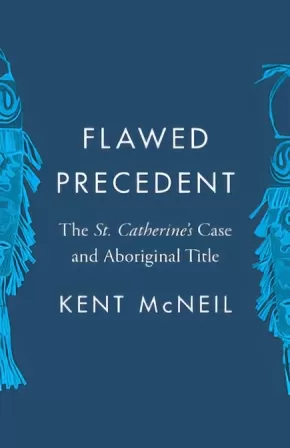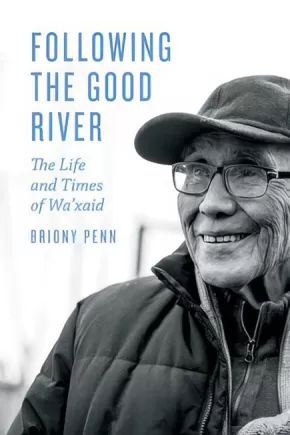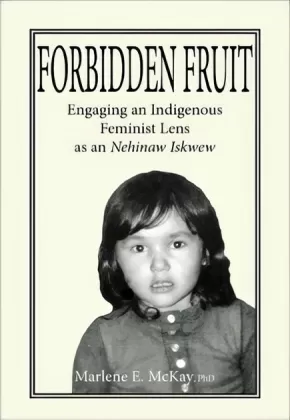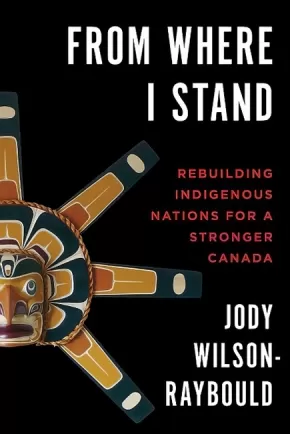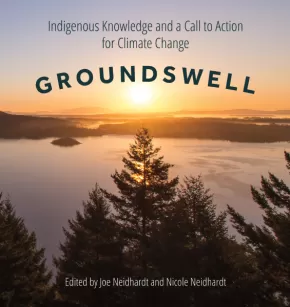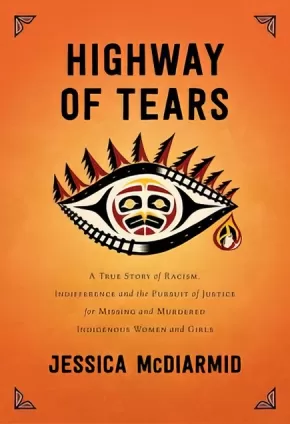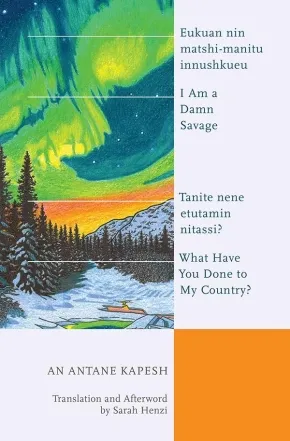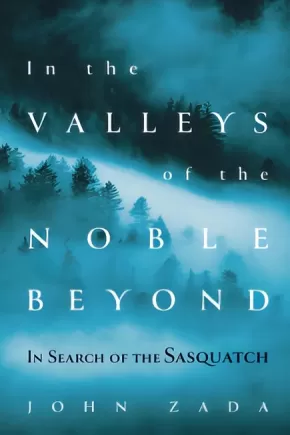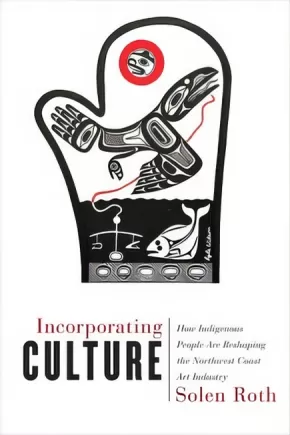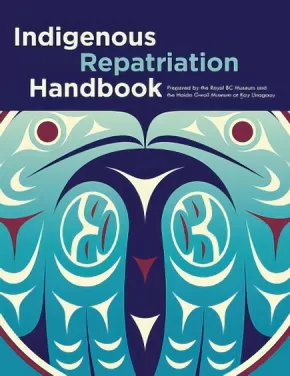
Social and Cultural Studies
391
-
405
of
556 Results;
Sort By
Go To
of 38
Eatenonha: Native Roots of Modern Democracy
$39.95
Format:
Hardcover
Text Content Territories:
Indigenous Canadian; First Nations; Huron-Wendat (Ouendat); Seawi Clan;
ISBN / Barcode: 9780773556393
Synopsis:
Synopsis:
An exploration of the historical and future significance of Canada's Native soul.
Eatenonha is the Wendat word for love and respect for the Earth and Mother Nature. For many Native peoples and newcomers to North America, Canada is a motherland, an Eatenonha - a land in which all can and should feel included, valued, and celebrated.
In Eatenonha Georges Sioui presents the history of a group of Wendat known as the Seawi Clan and reveals the deepest, most honoured secrets possessed by his people, by all people who are Indigenous, and by those who understand and respect Indigenous ways of thinking and living. Providing a glimpse into the lives, ideology, and work of his family and ancestors, Sioui weaves a tale of the Wendat's sparsely documented historical trajectory and his family's experiences on a reserve. Through an original retelling of the Indigenous commercial and social networks that existed in the northeast before European contact, the author explains that the Wendat Confederacy was at the geopolitical centre of a commonwealth based on peace, trade, and reciprocity. This network, he argues, was a true democracy, where all beings of all natures were equally valued and respected and where women kept their place at the centre of their families and communities.
Identifying Canada's first civilizations as the originators of modern democracy, Eatenonha represents a continuing quest to heal and educate all peoples through an Indigenous way of comprehending life and the world.
Reviews
"Eatenonha is a unique interweaving of self, family, First Nation, and Indigenous peoples of the Americas and elsewhere." - John Steckley, Humber College
Educator Information
Recommended in the Canadian Indigenous Books for Schools 2020/2021 resource list for grades 10 to 12 for use in these areas: English Language Arts and Social Studies.
Additional Information
200 pages | 6.00" x 9.00"
Environmental Activism on the Ground: Small Green and Indigenous Organizing
$39.99
Editors:
Format:
Paperback
Text Content Territories:
Indigenous American; Indigenous Canadian;
Grade Levels: 12; University/College;
ISBN / Barcode: 9781773850047
Synopsis:
Synopsis:
Environmental Activism on the Ground draws upon a wide range of interdisciplinary scholarship to examine small scale, local environmental activism, paying particular attention to Indigenous experiences. It illuminates the questions that are central to the ongoing evolution of the environmental movement while reappraising the history and character of late twentieth and early twenty-first environmentalism in Canada, the United States, and beyond.
This collection considers the different ways in which Indigenous and non-Indigenous activists have worked to achieve significant change. It examines attempts to resist exploitative and damaging resource developments, and the establishment of parks, heritage sites, and protected areas that recognize the indivisibility of cultural and natural resources. It pays special attention to the thriving environmentalism of the 1960s through the 1980s, an era which saw the rise of major organizations such as Greenpeace along with the flourishing of local and community-based environmental activism.
Environmental Activism on the Ground emphasizes the effects of local and Indigenous activism, offering lessons and directions from the ground up. It demonstrates that the modern environmental movement has been as much a small-scale, ordinary activity as a large-scale, elite one.
Reviews
"Environmental Activism on the Ground succeeds splendidly in complicating and enriching our understanding of modern environmentalism. Focusing on Indigenous and non-Indigenous activists in an impressive range of settings, Jonathan Clapperton and Liza Piper draw together and interpret diverse methodological and conceptual insights in a way that gives new, deserved prominence to those who have strived—and continue to strive—for environmental justice at the local level. These accounts left me both enlightened and heartened. Scholars from across the humanities and social sciences will welcome this volume." - Richard A. Rajala, Department of History, University of Victoria.
Educator Information
Table of Contents:
Illustrations
Acknowledgments
Introduction: In the Shadow of the Green Giants: Environmentalism and Civic Engagements - Jonathan Clappeton & Liza Piper
Part 1: Processes and Possibilities
1. Strategies for Survival: First Nations Encounters with Environmentalism - Anna J. Willow
2. Native/Non-Native Alliances: Challenging Fossil Fuel Industry Shipping at Pacific Northwest Ports - Zoltán Grossman
3. Conserving Contested Ground: Soverigenty-Driven Stewardship by the White Mountain Apache Tribe and the Fort Apache Heritage Foundation - Jon R. Welch
4. From Southern Alberta to Northern Brazil: Indigenous Conservation and the Preservation of Cultural Resources - Sterling Evans
5. Parks For and By the People: Acknowledging Ordinary People in the Formation, Protection, and Use of State and Provincial Parks - Jesica M. DeWitt
Part 2: Histories
6. Alternatives: Environmental and Indigenous Activism in the 1970s - Liza Piper
7. Marmion Lake Generating Station: Another Northern Scandal? - Tobasonakwut Peter Kinew
8. Environmental Activism as Anti-Conquest: The Nuu-chah-nulth and Environmentalists in the Contact Zone of Clayoquont Sound - Jonathan Clapperton
9. Local Economic Independence as Environmentalism: Nova Scotia in the 1970s - Mark Leeming
10. “Not an Easy Thing to Implement”: The Conservation Council of New Brunswick and Environmental Organization in a Resource-Dependent Province, 1969-1983 - Mark J. McLaughlin
11. The Ebb and Flow of Local Environmental Activism: The Society for Pollution and Environmental Control (SPEC), British Columbia - Jonathan Clapperton
12: From Scoieal Movement to Environmental Behemoth: How Greenpeace Got Big - Frank Zelko
Afterword: Lessons from the Ground Up - Jonathan Clapperton & Liza Piper
Bibliography
List of Contributors
Index
Additional Information
752 pages | 6.00" x 9.00"
Authenticity Note: Because this work includes contributions from Indigenous peoples, it has been labelled as containing Authentic Indigenous Text.
First Nations Self-Government: 17 Roadblocks, and One Chief's Thoughts on Solutions
$24.95
Format:
Paperback
Text Content Territories:
Indigenous Canadian; First Nations; Blackfoot Confederacy (Siksikaitsitapi); Siksika (Blackfoot);
Grade Levels: University/College;
ISBN / Barcode: 9781550598216
Synopsis:
Synopsis:
Indigenous Peoples in Canada are continuing to assert their right to self-determination in this era of reconciliation. While dozens of Indigenous communities have signed varying forms of self-government agreements with the federal government, Indigenous Nations still face many obstacles along the path to true self-determination.
As a former Chief of Siksika Nation in southern Alberta, Leroy Wolf Collar dealt with many of the same problems other Indigenous Nations face across the country. From serious housing shortages to the lack of opportunities for youth, Chief Wolf Collar experienced the challenges and frustrations that come from operating in a colonial system still constrained by the Indian Act.
How do Indigenous Peoples move on from this defective system? Chief Wolf Collar identifies 17 issues that currently hinder Indigenous Nations—including broken treaty promises, problems with common forms of band administration, and the intrusion of provincial governments—along with potential solutions to overcome them.
This guide is for current and aspiring Indigenous leaders who want to increase their understanding of good governance, management, and leadership, as well as those who want to explore issues around Indigenous self-determination in Canada.
Educator Information
Recommended in the Canadian Indigenous Books for Schools 2020/2021 resource list for grades 11 and 12 for use in these areas: Law, English Language Arts, and Social Studies.
Additional Information
128 pages | 6.00" x 9.00"
Flawed Precedent: The St. Catherine's Case and Aboriginal Title
$27.95
Format:
Paperback
Text Content Territories:
Indigenous Canadian; First Nations; Anishinaabeg; Ojibway; Saulteaux;
Grade Levels: University/College;
ISBN / Barcode: 9780774861069
Synopsis:
Synopsis:
In 1888, the Judicial Committee of the Privy Council in London ruled in St. Catherine’s Milling and Lumber Company v. The Queen, a case involving the Saulteaux people’s land rights in Ontario. This precedent-setting case would define the legal contours of Aboriginal title in Canada for almost a hundred years, despite the racist assumptions about Indigenous peoples at the heart of the case.
In Flawed Precedent, preeminent legal scholar Kent McNeil thoroughly investigates this contentious case. He begins by delving into the historical and ideological context of the 1880s. He then examines the trial in detail, demonstrating how prejudicial attitudes towards Indigenous peoples and their use of the land influenced the decision. He also discusses the effects that St. Catherine’s had on Canadian law and policy until the 1970s when its authority was finally questioned by the Supreme Court in Calder, then in Delgamuukw, Marshall/Bernard, Tsilhqot’in, and other key rulings.
McNeil has written a compelling and illuminating account of a landmark case that influenced law and policy on Indigenous land rights for almost a century. He also provides an informative analysis of the current judicial understanding of Aboriginal title in Canada, now driven by evidence of Indigenous law and land use rather than by the discarded prejudicial assumptions of a bygone era.
This book is vital reading for everyone involved in Aboriginal law or title, legal historians and scholars, and anyone interested in Indigenous rights in Canada.
Additional Information
224 pages | 5.50" x 8.50" | 10 b&w photos, 4 maps
Following the Good River: The Life and Times of Wa'xaid
$38.00
Format:
Hardcover
Text Content Territories:
Indigenous Canadian; First Nations; Haisla (Kitamaat); Xenaksiala (Henaksiala);
ISBN / Barcode: 9781771603218
Synopsis:
Synopsis:
Based on recorded interviews and journal entries this major biography of Cecil Paul (Wa’xaid) is a resounding and timely saga featuring the trials, tribulations, endurance, forgiveness, and survival of one of North American’s more prominent Indigenous leaders.
Born in 1931 in the Kitlope, Cecil Paul, also known by his Xenaksiala name, Wa’xaid, is one of the last fluent speakers of his people’s language. At age ten he was placed in a residential school run by the United Church of Canada at Port Alberni where he was abused. After three decades of prolonged alcohol abuse, he returned to the Kitlope where his healing journey began. He has worked tirelessly to protect the Kitlope, described as the largest intact temperate rainforest watershed in the world. Now in his late 80s, he resides on his ancestors’ traditional territory.
Following upon the success of Wa'xaid's own book of personal essays, Stories from the Magic Canoe, Briony Penn's major biography of this remarkable individual will serve as a timely reminder of the state of British Columbia's Indigenous community, the environmental and political strife still facing many Indigenous communities, and the philosophical and personal journey of a remarkable man.
Additional Information
376 pages | 6.00" x 9.00"
Forbidden Fruit: Engaging an Indigenous Feminist Lens as an Nehinaw Iskwew (4 in Stock, Out of Print)
$23.00
Format:
Paperback
Text Content Territories:
Indigenous Canadian; First Nations; Cree (Nehiyawak); Swampy Cree ;
Grade Levels: University/College;
ISBN / Barcode: 9781926476254
Synopsis:
Synopsis:
Forbidden Fruit: Engaging an Indigenous Feminist Lens as an Neninaw Iskwew is a feminist based memoir acknowledging that people are measured, categorized, and placed in a hierarchal order that is deeply influenced by discourses predicated upon social processes.
Dr. McKay’s Indigenous feminism is about being aware that due to the colonial patriarchy that has seeped through Indigenous social and cultural systems, Indigenous women are positioned differently in economic, social and political structures. Marlene masterfully uses her own life experiences to assert that colonialism and Indigenous cultures obscure the role of women in a way that continues both their marginalization and the binary of the princess/squaw (p. 11).
Additional Information
98 pages | 6.00" x 9.00"
From Where I Stand: Rebuilding Indigenous Nations for a Stronger Canada
$24.95
Format:
Paperback
Text Content Territories:
Indigenous Canadian;
Grade Levels: 12; University/College;
ISBN / Barcode: 9780774880534
Synopsis:
Synopsis:
An Indigenous leader who has dedicated her life to Indigenous Rights, Jody Wilson-Raybould has represented both First Nations and the Crown at the highest levels. And she is not afraid to give Canadians what they need most – straight talk on what has to be done to deconstruct the colonial legacy and achieve true reconciliation in Canada.
In this powerful book, drawn from Wilson-Raybould’s speeches and other writings, she urges us all – governments, Indigenous Nations, everyone – to build upon the momentum already gained in the reconciliation process or risk hard-won progress being lost. The choice is stark: support Indigenous-led initiatives for Nation rebuilding or revert to governments just managing “the problem.” Frank and impassioned, she also argues that true reconciliation will never occur so long as governments deny Indigenous Peoples their rights and the Indian Act continues to exist. Until then, we’ll be stuck in the status quo – mired in conflicts and expensive court cases that do nothing to improve people’s lives or heal the country.
The good news is that Indigenous Nations already have the solutions. Now it is time to act and build a shared future based on the foundations of trust, cooperation, good governance, and recognition. Removing the barriers that are keeping these solutions from being put into effect will not only empower Indigenous Peoples – it will enrich all Canadians and make Canada stronger.
From Where I Stand is indispensable reading for anyone who wants to dig deeper into the reconciliation process and know what they can do to make a difference, from engaged citizens and students to leaders and policy-makers, educators and academics, and lawyers and consultants.
Reviews
"From Where I Stand is a must-read book for all Canadians. Puglaas shares a clear understanding of where we have come from, the issues we must address, and the pathways to a transformed future. Having witnessed her remarkable courage and capacity as Canada’s attorney general and her determination to do what is right without succumbing to unrelenting political pressure, Puglaas stands tall among Canadians as a person for whom truth, thoughtfulness, and principle are not mere words – but values to sustain a different kind of policy and politics." - Mary Ellen Turpel-Lafond (Aki-Kwe), Professor of Law, Allard Law School UBC, and Director of the Residential School History and Dialogue Centre
"Jody Wilson-Raybould's quest for justice has long driven her work. I first saw this when she was a law student and this commitment to justice has only been deepened by subsequent public service. Her unwavering commitment to reconciliation, balance, and good governance springs off every page of this book." - John Borrows, Canada Research Chair in Indigenous Law, University of Victoria Law School
Educator Information
Table of Contents
Foreword
Introduction
Moving through the Postcolonial Door
We Truly Have Come a Long Way ...
Idle No More and Recapturing the Spirit and Intent of the Two Row Wampum
On the Parallels, and Differences, between Canada and South Africa
Our Shared Histories and the Path of Reconciliation
Rights and Recognition
Self-Determination and the Inherent Right of Self-Government
Translating Hard-Fought-For Rights into Practical and Meaningful Benefits
UNDRIP Is the Start Not the Finishing Line
Defining the Path of Reconciliation through Section 35
Indigenous Rights Are Human Rights
Implementing UNDRIP
Governance in the Post-Indian Act World
Toppling the Indian Act Tree
First Nations Jurisdiction over Citizenship
Holding and Managing Our Lands
On Accountability and Transparency
Developing a New Fiscal Relationship
The Governance Toolkit and Building on Our Success
Building Business Relationships and the Duty to Consult
Economic Development Depends on Self-Government
First Nations Are Not a Box to Tick Off
Who Owns and Is Responsible for the Water?
On Certainty and Why It’s Elusive
Restoring Balance, Correcting Injustices, and Remaining Vigilant
A Litmus Test for Reconciliation Is the Status of Women
Preventing First Contacts with the Criminal Justice System
On Sticking Our Necks Out
On Obstruction, Denial, and Canada’s Failure to Uphold the Rule of Law
Each of Us, In Our Own Way, Is a Hiligaxste’
Acknowledgments
A Note on Terminology and the Speeches
Index
Additional Information
264 pages | 6.00" x 9.00"
Groundswell: Indigenous Knowledge and a Call to Action for Climate Change
$49.95
Artists:
Editors:
Format:
Hardcover
Text Content Territories:
Indigenous;
ISBN / Barcode: 9781771743440
Synopsis:
Synopsis:
Groundswell is a collection of stirring and passionate essays from both Indigenous and non-Indigenous writers that eloquently present a compelling message about how traditional Indigenous knowledge and practices can and must be used to address climate change. The chapters interconnect, taking us from radical thinking to the gentleness of breath, and demonstrate that we are all in this together—everyone must understand what needs to be accomplished and participate in the care of Mother Earth.
Authors tap into religious and spiritual perspectives, explore the wisdom of youth, and share the insights of a nature-based philosophy. These collective writings give you a chance to contemplate and formulate your own direction. A moral revolution that can produce a groundswell of momentum toward a diverse society based on human rights, Indigenous rights, and the rights of Mother Earth.
Beautifully illustrated with photographs, Groundswell is augmented with video recordings from the authors and a short documentary film, available on the project’s website. Profits from the book will help support the videos, documentary, and future projects of The Call to Action for Climate Change. Visit www.envisionthebigpicture.com.
Reviews
"A beautifully illustrated and highly engaging read is Groundswell: Indigenous Knowledge and a Call to Action for Climate Change, edited by Joe Neidhardt and Nicole Neidhardt. Essays from both Indigenous and non-Indigenous contributors present a strong vision for how traditional knowledge can be used to fight climate change, as well as how we can work together toward a more balanced and harmonious relationship with nature." - Joan Elliott, Librarian/Manager, Stewart Resources Centre
“The most important environmental development of the last decade is the full emergence and full recognition of the Native leadership at the very front of every fight. One of the things that makes that leadership so powerful is its deep roots in tradition and thought; this book gives the reader some sense of that tradition, though of course it is so vast that it would take a thousand such books to capture it all!”— Bill McKibben; Author Eaarth: Making a Life on a Tough New Planet
“This book shares Indigenous knowledge that can teach us to listen to and be in relationship to the Earth in a way that honors the sacredness and interdependence of all life forms. A paradigm shift, informed by Indigenous ways of knowing and acting, is crucial in this time of climate change.”— Laura Stivers; Author of Disrupting Homelessness: Alternative Christian Approaches
“Groundswell: Indigenous Knowledge and a Call to Action for Climate Change... is a powerful text that introduces a much-needed perspective on the issue of climate change. Much has been said and written on the topic of climate change from a purely logical perspective, which is essential, but Groundswell introduces an equally important perspective, that of the spiritual implications of climate change. From the perspective of Native people, we start to unravel the complex emotions when learning of the negative effects of climate change through an entirely different lens than the lens supplied to us through westernized education. There is an aspect of spiritual connection that Native people have when approaching the topic of climate change and the destructive and corrosive actions taken against our Earth. I hate to use the phrase “spiritual connection,” because spirituality has been wrongly stripped down to a non-science, when in reality, it is something that just cannot be defined by science. One’s spirit is only one way of saying, one’s being, essence, one’s present energy, or one’s connection to all that is, beyond thought and logic. It is the core of us all, and it is a feeling that connects us all, and in my opinion, uniquely respected and understood by Native people. This is one reason I believe Native people feel an obligation to protect this Earth, because we hold this truth close culturally. We and everything are one, and the destruction of our planet is also the destruction of ourselves. When reading the chapter “Rooted: Staying Grounded Amidst a Changing Landscape” by Nicole Neidhardt, Teka Everstz, and Gina Mowatt, I was moved by the presence of youth voices. As a young, Indigenous person myself I felt a great power, understanding, and nuance to the voices emerging in the chapter. The writers spoke of the complexities and the duality of living as an Indigenous person in western society that I have myself experienced. They also addressed the modern paradox of social media, in that in as many ways as it is bringing people together, in many ways it is tearing us apart and allowing for non-accountability in our society. It is rare to find a text that so genuinely sums up the issues of living as an Indigenous youth in western culture and our struggle of being heard when voicing our truths. I believe that this text, in the hands of other young people like the writers will be moved by it like I was. Nicole Neidhardt, Teka Everstz, and Gina Mowatt asked for more than a challenge of the reader’s ideology, they screamed out for a call to action." — Forrest Goodluck; Award-winning youth filmmaker, appears opposite Leonardo DiCaprio in The Revenant
“Reading the reflections of three young Indigenous activists (Rooted: Staying Grounded Amidst a Changing Landscape) is special and something I’ve admittedly never experienced before. What I thought about while reading this was my own decades' long growing pains, not just in body, but rather identity. My own insecurities has led me down dark walkways toward depression and anxiety. For years—and still to this day—I am petrified of the inescapable uncertainty the universe’s laws present me. I had zero doubts about three Cosmic proclamations: death, taxes and thermodynamics. Their stories are a sharp, buoyant reminder of elation and advocacy in a world of overwhelming and seemingly unlimited power: colonialism, imperialism and industrial capitalism. These narratives bring me moral conviction and faith as we all walk hand-in-hand into our carbon wrought future.” — Kalen Goodluck; A freelance documentary photographer, photojournalist, and journalist
“Groundswell is about helping one another through the threat of death we experience on this increasingly traumatized planet—in the air, on the land and in the water—and nurturing it back to life. Neidhardt and his kindred spirits offer us new, yet familiar, resources for a creative participation in that gracious process. “New” for us who are not yet listening attentively to Indigenous instructions voiced in their “Older Testament.” “Familiar” insofar as we are given to see, truly see, our relatedness and belonging to all things, great and small, in this created world, our “common home” (Pope Francis). One message powerfully conveyed throughout this book is that planetary health is primary, whereas human well-being is derivative (Thomas Berry). This message turns the infamous “Doctrine of Discovery” upside down, inviting us, all of us together, into fresh discoveries of healing wisdom in ancient treasures still alive and well for us. Again, “together”: “A little trickle of water that goes alone goes crookedly” (Gbaya proverb). Together we may pray for vibrant faith and spiritual rootedness to yield justice: equilibrium throughout creation and among all people. Such faith is indeed a “renewable energy” (Larry Rasmussen)!” — Thomas G. Christensen; Author of An African Tree of Life
Educator Information
Recommended Resource for Grades 11-12 and College/University Students.
Social Studies/B.C. First Peoples/Comparative Cultures/Contemporary Indigenous Studies Curricular Concepts Explored in the Text:
- Interactions between cultures and the natural environment.
- The role of value systems and belief systems in the development of cultures.
- Varied identities and worldviews of Indigenous peoples, and the importance of the interconnection of family, relationships, language, culture, and the land.
- Factors that sustain and challenge the identities and worldviews of Indigenous peoples.
Science/Environmental Science Curricular Concepts Explored in the Text:
- First Peoples knowledge and other traditional ecological knowledge in sustaining biodiversity.
- Human actions and their impact on ecosystem integrity.
- First Peoples ways of knowing and doing.
- Resource stewardship.
English/English First Peoples Curricular Concepts Explored in the Text:
- First Peoples languages and texts reflect their cultures, knowledge, histories, and worldviews.
- Critically, creatively, and reflectively explore ideas within, between, and beyond texts.
- Construct meaningful personal connections between self, text, and world.
- The diversity within and across First Peoples societies as represented in texts.
TABLE OF CONTENTS
Preface
Invocation: Using Contemplative Meditation to Foster Change
Introduction: This Is the Moral Revolution
Climate Change Snapshots by Kristen Dey
Rooted: Staying Grounded Amidst a Changing Landscape by Nicole Neidhardt, Teka Everstz, and Gina Mowatt
What You Need to Know Is Not in a Book: Indigenous Education by Larry Emerson
Illuminating the Path Forward by Erin Brillon
Stories from Our Elders by Andy Everson
Religions for the Earth by Karenna Gore
How We Can Work Together by Merle Lefkoff
Essential Elements of Change by Mary Hasbah Roessel
The Radical Vision of Indigenous Resurgence by Taiaiake Alfred
Sharing the Wealth: Bending Toward Justice by Rod Dobell
The Commonwealth of Breath by David Abram
Science, Spirituality, Justice by Larry Rasmussen
The Moral Revolution, Weaving All the Parts by Joe Neidhardt
Acknowledgements
Further References
Further Readings
Contributors
Contributors: David Abram, Taiaiake Alfred, Erin Brillon, Kristen Dey, Rod Dobell, Larry Emerson, Andy Everson, Teka Everstz, Karenna Gore, Merle Lefkoff, Gina Mowatt, Joe Neidhardt, Nicole Neidhardt, Larry Rasmussen, Mary Hasbah Roessel.
Additional Information
208 Pages | 8.5" x 9" | ISBN: 9781771743440 | Hardcover
Highway of Tears: A True Story of Racism, Indifference and the Pursuit of Justice for Missing and Murdered Indigenous Women and Girls
$21.00
Format:
Paperback
Text Content Territories:
Indigenous Canadian;
Grade Levels: University/College;
ISBN / Barcode: 9780385687591
Synopsis:
Synopsis:
A penetrating and deeply moving account of the missing and murdered Indigenous women and girls of Highway 16, and a searing indictment of the society that failed them.
For decades, Indigenous women and girls have gone missing or been found murdered along an isolated stretch of highway in northwestern British Columbia. The highway is known as the Highway of Tears, and it has come to symbolize a national crisis.
Journalist Jessica McDiarmid meticulously investigates the devastating effect these tragedies have had on the families of the victims and their communities, and how systemic racism and indifference has created a climate where Indigenous women and girls are over-policed, yet under-protected. Through interviews with those closest to the victims--mothers and fathers, siblings and friends--McDiarmid provides an intimate, first-hand account of their loss and unflagging fight for justice. Examining the historically fraught social and cultural tensions between settlers and Indigenous peoples in the region, McDiarmid links these cases to others across Canada--now estimated to number up to 4,000--contextualizing them within a broader examination of the undervaluing of Indigenous lives in the country.
Highway of Tears is a piercing exploration of our ongoing failure to provide justice for missing and murdered Indigenous women and girls, and testament to their families and communities' unwavering determination to find it.
Additional Information
352 pages | 6.00" x 9.00"
I Am a Damn Savage; What Have You Done to My Country?
$22.99
Format:
Paperback
Text Content Territories:
Indigenous Canadian; First Nations; Innu (Montagnais-Naskapi);
Grade Levels: University/College;
ISBN / Barcode: 9781771124089
Synopsis:
Synopsis:
Quebec author An Antane Kapesh's two books, Je suis une maudite sauvagesse (1976) and Qu'as-tu fait de mon pays? (1979), are among the foregrounding works by Indigenous women in Canada. This English translation of these works, presented alongside the revised Innu text, makes them available for the first time to a broader readership.
In I Am a Damn Savage, Antane Kapesh wrote to preserve and share her culture, experience, and knowledge, all of which, she felt, were disappearing at an alarming rate because many Elders – like herself – were aged or dying. She wanted to publicly denounce the conditions in which she and the Innu were made to live, and to address the changes she was witnessing due to land dispossession and loss of hunting territory, police brutality, and the effects of the residential school system. What Have You Done to My Country? is a fictional account by a young boy of the arrival of les Polichinelles and their subsequent assault on the land and on native language and culture.
Through these stories Antane Kapesh asserts that settler society will eventually have to take responsibility and recognize its faults, and accept that the Innu – as well as all the other nations – are not going anywhere, that they are not a problem settlers can make disappear.
Additional Information
216 pages | 5.25" x 8.00" | Translation and Afterword by Sarah Henzi
In the Valleys of the Noble Beyond: In Search of the Sasquatch
$19.95
Format:
Hardcover
Text Content Territories:
Indigenous Canadian; First Nations; Heiltsuk (Bella Bella); Nuxalk (Bella Coola); Tsimshian (Ts'msysen);
ISBN / Barcode: 9781771645188
Synopsis:
Synopsis:
This evocative work of nature writing traverses the world’s largest temperate rainforest to uncover the legend of the Sasquatch.
Canada’s Great Bear Rainforest is home to trees as tall as skyscrapers and moss as thick as carpet. According to the people who live there, another giant may dwell in these woods. For centuries, locals have reported encounters with the Sasquatch—a species of hairy man-ape that could inhabit this pristine wilderness. Driven by his childhood obsession with the Sasquatch, but remaining skeptical, journalist John Zada seeks out the people and stories surrounding this enigmatic creature. He speaks with local Indigenous peoples and a Sasquatch-studying scientist. He hikes with a former bear hunter. Soon, he finds himself on quest for something infinitely more complex, cutting across questions of human perception, scientific inquiry, Indigenous traditions, the environment, and the power of the human imagination to believe in—or to outright dismiss—one of nature’s last great mysteries.
Reviews
"Totally gripping and unputdownable. Destined to be a classic of adventure" - Jason Webster, author of A Death in Valencia
"A captivating tale of the search for a mythical creature, In the Valleys of the Noble Beyond is also a story about us - and our enduring desire to believe in something big, really big, that is out there lurking." - Harley Rustad, author of Big Lonely Doug
Additional Information
336 pages | 6.00" x 9.00"
Incorporating Culture: How Indigenous People Are Reshaping the Northwest Coast Art Industry
$32.95
Format:
Paperback
Text Content Territories:
Indigenous Canadian;
Grade Levels: University/College;
ISBN / Barcode: 9780774837392
Synopsis:
Synopsis:
Fragments of culture often become commodities when the tourism and heritage business showcases local artistic and cultural practice. And frequently, this industry is developed without the consent of those whose culture is being commercialized. What does this say about appropriation, social responsibility, and intercultural relationships? And what happens when local communities become more involved in this cultural marketplace?
Based on eighteen months of ethnographic fieldwork, Incorporating Culture examines how Northwest Coast Indigenous artists and entrepreneurs are cultivating more equitable relationships with the companies that reproduce their designs on everyday objects. Focusing on the vibrant Indigenous art industry in Vancouver, Solen Roth details how artists are slowly but surely modifying an essentially capitalist market to reflect Indigenous models of property, relationships, and economics.
Moving beyond the assumption that the commodification of Indigenous culture is necessarily exploitative, Incorporating Culture discusses how communities can treat culture as a resource in a way that nurtures rather than depletes it. From this fresh perspective, Roth sheds light on the processes by which Indigenous people have been asserting control over the Northwest Coast art industry – not by shutting the market down but by reshaping it in order to reflect their communities’ values and ways of life.
Scholars and students in a broad range of disciplines who are interested in the relationship between commerce and Indigenous art and design will find this book illuminating, as will thoughtful participants in the Indigenous art market.
Reviews
"Roth takes a refreshing approach to Northwest Coast art. It does not privilege the historical, nor the fine art market or ceremonial art. Rather, Roth takes seriously the artware made to leave Indigenous communities. She makes a compelling case for reframing the ‘souvenir’ art market on the Pacific Coast as ‘culturally modified capitalism,’ in which Indigenous stakeholders actively shape this industry in locally meaningful ways through intensive engagement with provincial, federal, and global systems." - Cara Krmpotich, associate professor, Faculty of Information, University of Toronto
"There is no other book on Native American art like Incorporating Culture. It brings forward new and fascinating perspectives on the myriad examples of Northwest Coast First Nations artware seen in shops, revealing the strength of Northwest Coast values and practices as they penetrate and influence what might be seen from the outside as a strictly capitalist venture." - Aldona Jonaitis, director, University of Alaska Museum of the North
Educator Information
Useful for these subject areas: Indigenous Studies, Art History, Cultural Studies, Anthropology, Indigenous Art
Additional Information
240 pages | 6.00" x 9.00"
Indigenous Peoples and Dementia: New Understandings of Memory Loss and Memory Care
$32.95
Format:
Paperback
Text Content Territories:
Indigenous American; Indigenous Canadian;
Grade Levels: University/College;
ISBN / Barcode: 9780774837842
Synopsis:
Synopsis:
Dementia is on the rise around the world, and health organizations in Canada, the United States, and New Zealand are responding to the urgent need – voiced by communities and practitioners – for guidance on how best to address memory loss in Indigenous communities. This innovative volume responds to the call by bringing together, for the first time, research studies and Indigenous teaching stories on this topic. Using decolonizing methods, it addresses key areas of concern with chapters that:
- examine the prevalence and causes of dementia, as well as the public discourse surrounding the issue
- provide examples for incorporating Indigenous perspectives on care and prevention into research and practice
- demonstrate culturally safe applications of research to Elder care.
Presenting strategies for health practice and effective collaborative research informed by Indigenous knowledge and worldviews, this book is a valuable resource for researchers, practitioners, students, and educators who seek a better understanding of memory loss and memory care.
This book will be of interest to students, educators, researchers, and practitioners working in or interested in the fields of dementia studies and Indigenous health.
Reviews
"This book represents the first significant contribution to what we know about how Indigenous peoples understand dementia and memory loss." - from the foreword by Rod McCormick (Kanienkehaka), professor and British Columbia Innovation Council research chair in Aboriginal Health, Faculty of Education and Social Work, Thompson Rivers University
"A leap forward in understanding how health care can be provided in culturally safe ways." - Lloy Wylie, assistant professor, Schulich School of Medicine and Dentistry, Western University
Educator Information
Table of Contents
Foreword / Rod McCormick
Introduction / Wendy Hulko, Jean E. Balestrery, and Danielle Wilson
We Call It Healing / Secwepemc Elder, Wendy Hulko, Danielle Wilson, Star Mahara, Gwen Campbell-McArthur, Jean William, Cecilia DeRose, and Estella Patrick Moller
Part 1: Prevalence, Causes, and Public Discourse
1 Current and Projected Dementia Prevalence in First Nations Populations in Canada / Jennifer Walker and Kristen Jacklin
2 Indigenous Vascular Dementia: An Indigenous Syndemic Dementia Model / J. Neil Henderson, Linda D. Carson, and Kama King
3 A Story about Joe in the News Media: Decolonizing Dementia Discourse / Suzanne MacLeod
Coyote: Keeper of Memories / Danielle Wilson, Gwen Campbell-McArthur, Wendy Hulko, Star Mahara, Jean William, Cecilia DeRose, and Estella Patrick Moller
Part 2: Indigenous Perspectives on Care and Prevention
4 Perceptions of Dementia Prevention among Anishinaabe Living on Manitoulin Island / Jessica E. Pace, Kristen Jacklin, Wayne Warry, and Karen Pitawanakwat
5 The Understanding from Within Project: Perspectives from Indigenous Caregivers / Carrie Bourassa, Melissa Blind, Kristen Jacklin, Eric Oleson, and Kate Ross-Hopley
6 Oldest Age Does Not Come Alone: “What’s the Name of the Day?” / Mere Kēpa
A Fecund Frontier: We Listen ... in between Talk ... We Listen / Jean E. Balestrery and Sophie “Eqeelana Tungwenuk” Nothstine
Part 3: Applying Theory and Knowledge to Practice
7 Depression, Diabetes, and Dementia: Historical, Biocultural, and Generational Factors among American Indian and Alaska Native Elders / Linda D. Carson, J. Neil Henderson, and Kama King
8 Adapting CIRCA-BC in the Post-Residential-School Era / Barbara Purves and Wendy Hulko
9 Focus(ing) on Love and Respect: Translating Elders’ Teachings on Aging and Memory Loss into Learning Tools for Children and Youth / Wendy Hulko, Danielle Wilson, and Jessica Kent
Conclusion / Wendy Hulko, Jean E. Balestrery, and Danielle Wilson
Index
Additional Information
264 pages | 6.00" x 9.00"
Indigenous Relations: Insights, Tips & Suggestions to Make Reconciliation a Reality
$19.95
Format:
Paperback
Text Content Territories:
Indigenous Canadian; First Nations; Inuit; Métis;
ISBN / Barcode: 9781989025642
Synopsis:
Synopsis:
Indigenous Relations: Your Guide to Working Effectively with First Nations, Métis, and Inuit.
A timely sequel to the bestselling 21 Things You May Not Know About the Indian Act - and an invaluable guide for anyone seeking to work more effectively with Indigenous Peoples.
We are all treaty people. But what are the everyday impacts of treaties, and how can we effectively work toward reconciliation if we're worried our words and actions will unintentionally cause harm?
Hereditary chief and leading Indigenous relations trainer Bob Joseph is your guide to respecting cultural differences and improving your personal relationships and business interactions with Indigenous Peoples. Practical and inclusive, Indigenous Relations interprets the difference between hereditary and elected leadership, and why it matters; explains the intricacies of Aboriginal Rights and Title, and the treaty process; and demonstrates the lasting impact of the Indian Act, including the barriers that Indigenous communities face and the truth behind common myths and stereotypes perpetuated since Confederation.
Indigenous Relations equips you with the necessary knowledge to respectfully avoid missteps in your work and daily life, and offers an eight-part process to help business and government work more effectively with Indigenous Peoples - benefitting workplace culture as well as the bottom line. Indigenous Relations is an invaluable tool for anyone who wants to improve their cultural competency and undo the legacy of the Indian Act.
Educator Information
Recommended in the Canadian Indigenous Books for Schools 2020/2021 resource list for grades 11 and 12 in these areas: Social Studies, Law, English Language Arts, and Social Justice.
Additional Information
200 pages | 8.00" x 5.00"
Indigenous Repatriation Handbook
$29.95
Format:
Paperback
Text Content Territories:
Indigenous Canadian;
Grade Levels: University/College;
ISBN / Barcode: 9780772673176
Synopsis:
Synopsis:
A reference for BC Indigenous communities and museums, created by and for Indigenous people working in repatriation.
"Our late friend and brother Rod Naknakim said, 'Reconciliation and repatriation cannot and should not be separated. The two must anchor our conversation and guide our efforts as we move forward collectively with common purpose and understanding.'" - Dan Smith, BCMA Indigenous Advisory Chair, Nuyumbalees Cultural Centre
We are in a new era of reconciliation that involves repatriation - the return of Indigenous objects and Ancestral remains to their home communities - and the creation of meaningful relationships between museums and Indigenous communities. This handbook, the first to be created by and for Indigenous people, provides practical information that will enable each of the 34 unique Indigenous language and cultural groups in BC to carry out the process of repatriation in ways that align with the cultural traditions of each respective community. It also provides information that will be helpful to museums, and to Indigenous communities across Canada.
Educator Information
Acknowledgements vii
Message from Lucy Bell, Head of the Indigenous Collections and
Repatriation Department, Royal BC Museum ix
Message from Professor Jack Lohman CBE, Chief Executive Officer,
Royal BC Museum, and Tracey Herbert, CEO, First Peoples’
Cultural Council x
Part 1: Introduction 1
Part 2: Organizing a Successful Repatriation 13
Part 3: Conducting Research 29
Part 4: Repatriation from the Royal BC Museum 39
Part 5: Repatriation from Other Institutions 49
Part 6: For Institutions Wishing to Repatriate to Indigenous Peoples in BC 61
Part 7: Case Study: Repatriation Journey of the Haida Nation 67
Appendix A: Glossary of Terms 74
Appendix B: Indigenous Museums and Cultural Centres in Canada 77
Appendix C: Organizational Templates, Procedures and Examples 80
Appendix D: Fundraising Resources 98
Appendix E: Sample Letters to Museums 105
Appendix F: Tips for Planning for Travel and Transport 111
Appendix G: Global Museums with Major Indigenous Collections from BC 116
Appendix H: Resources on Education in Indigenous Museology 150
Appendix I: Frequently Asked Questions about Repatriation 154
Appendix J: Repatriation Success Stories 158
Additional Information
174 pages | 8.50" x 10.98"
Sort By
Go To
of 38

